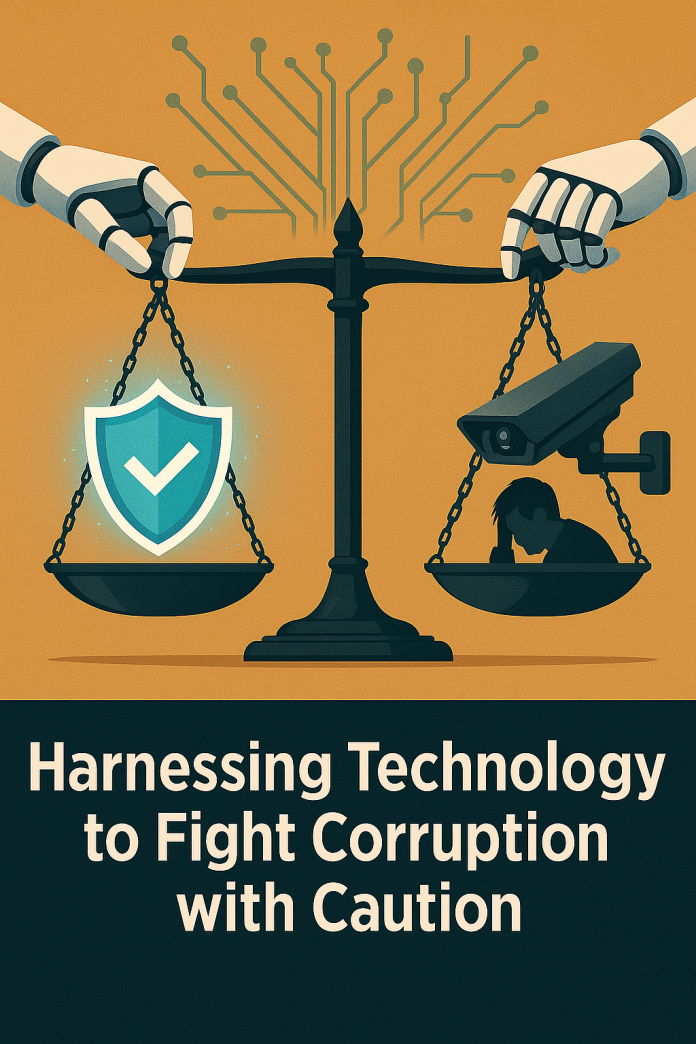The fight against corruption has seen a surge in optimism fueled by technological advancements. Artificial intelligence (AI), blockchain, big data analytics, and digital transparency mechanisms have become central to modern anti-corruption efforts. From detecting financial irregularities to automating procurement oversight, these technologies promise to expose corruption in real time, strengthen institutional accountability, and foster public trust.
However, as recent studies from the U4 Anti-Corruption Resource Centre suggest, these tools are not foolproof. While technology can potentially transform governance and reduce corruption, its misuse or misapplication can create dystopian consequences, particularly in countries with weak democratic systems. Without proper safeguards, these technologies can entrench bias, violate privacy, and even disproportionately target marginalized communities, as seen in the Dutch tax authority’s AI-driven fraud detection scandal.
The Promise of Anti-Graft Technology
Technological tools offer a powerful arsenal for fighting corruption:
- AI-Powered Fraud Detection: AI can identify suspicious patterns in government contracts, procurement processes, and tax systems. It can analyze large datasets to flag high-risk transactions or inconsistencies that may indicate corruption.
- Blockchain for Transparent Governance: Blockchain technology ensures that every transaction or government record is immutable and traceable, making it almost impossible to alter or delete critical data. Countries like Georgia have successfully integrated blockchain into land registry systems to reduce corruption and enhance trust.
- Big Data Analytics and Predictive Modelling: Massive datasets collected from public institutions can be analyzed to predict corrupt behavior or identify areas vulnerable to graft. By scrutinizing government expenditures, contracts, and financial flows, corruption can be preemptively tackled before it festers.
- Digital Public Services and E-Governance: When public services are digitized, opportunities for corruption in physical interfaces, such as bribery and extortion, decrease. E-governance systems, like those implemented in Estonia, have reduced corruption by limiting human discretion in service delivery.
The Perils of Overreliance on Tech: The Dystopian Threat
Despite the promise, technology in anti-corruption efforts can have unintended consequences:
-
Bias and Discrimination: AI models trained on historical data can inadvertently replicate existing societal biases. In the Netherlands, an AI-based system used to predict welfare fraud disproportionately targeted individuals from ethnic minorities, leading to a national scandal that prompted the resignation of the government.
-
Surveillance and Privacy Concerns: Excessive surveillance in the name of curbing corruption can violate fundamental human rights. In some regimes, anti-corruption technologies have been weaponized to target political opponents and dissenters, creating a surveillance state under the guise of transparency.
-
Algorithmic Injustice: Rule-by-algorithm may lead to opaque decision-making processes where individuals affected by adverse decisions have no recourse for redress. Without a robust human oversight mechanism, AI systems could unjustly penalize innocent citizens.
Context Matters: Lessons for Nigeria
Nigeria, a nation with a history of corruption challenges, stands to benefit greatly from technology-driven anti-graft reforms. However, the Nigerian context underscores the need for a cautious and contextualized approach. The deployment of these technologies must consider:
-
Strengthening Legal Safeguards: Regulatory frameworks, such as the proposed Nigerian Data Protection Act, should ensure that anti-corruption technologies comply with privacy standards and safeguard citizens’ rights.
-
Investing in Digital Literacy: Public officials and civil society must be equipped with the knowledge to interpret data and effectively utilize technological tools. Without capacity-building, technology risks becoming a black box that only a privileged few understand.
-
Balancing Tech with Human Oversight: Technology should complement, not replace, human decision-making. Independent anti-corruption agencies, like Nigeria’s Economic and Financial Crimes Commission (EFCC), must remain vigilant to ensure that technological tools enhance due process and accountability.
Sustainability Reporting and Anti-Corruption: Private Sector Role
Beyond government, the private sector must also play a significant role in curbing corruption through improved governance. A recent U4 publication, Sustainability Reporting and Anti-Corruption Provisions: Unlocking the Potential for Impact, highlights that integrating anti-corruption measures within sustainability frameworks enhances corporate transparency. For Nigerian companies navigating the complexities of the global economy, aligning their practices with global sustainability standards can improve trust, attract foreign investment, and reduce corruption risks.
Way Forward: Safeguarding the Tech-Utopia Vision
As Nigeria moves toward greater digital governance, it is essential to build a system that prioritizes techno-integrity—where technology is wielded to uphold transparency while respecting human rights. Development partners, international donors, and Nigerian policymakers must exercise the same discipline in using technology as they do with any other anti-corruption tool. As the U4 reflections suggest, “a hammer is good for hammering, but not all hammering is good.”
Nigeria’s fight against corruption requires a careful balancing act between leveraging technology for good and preventing dystopian outcomes. By placing people at the center of tech-driven anti-corruption efforts, Nigeria can move closer to the utopian vision of a society where integrity is ingrained and corruption is the exception, not the norm.
This editorial is brought to you by Newspot Nigeria, committed to providing insightful, well-researched commentary on Nigeria’s governance, development, and anti-corruption landscape.
Share your story or advertise with us: Whatsapp: +2347068606071 Email: info@newspotng.com
















